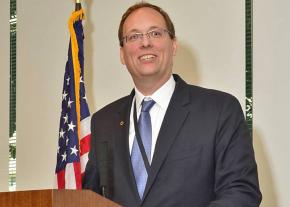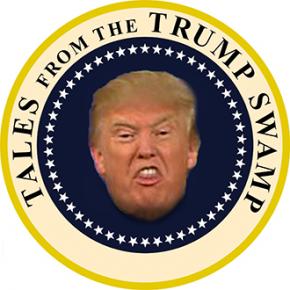Holding out a helping hand to the banksters
Meet Keith Noreika, a lawyer for the banksters-turned-interim head of the Treasury office in charge of regulating banks. makes the introductions.
THE OFFICE of the Comptroller of the Currency (OCC) is a bureau within the Department of the Treasury that is the main institution responsible for regulating national banks.
According to the OCC's website, the bureau has "played a vital role in assuring the health and well-being of the nation's financial system" by having "set and achieved the highest standards of public service."
"Under the direction of the Comptroller of the Currency," a 2008 OCC document informs us, "the national banking system" has "acquired a reputation for safety and soundness that [has] inspired confidence from the banking public."
Whatever confidence the national banking system may have enjoyed in 2008, however, largely turned into resentment as a result of the financial crisis that began to unfold that year.
Donald Trump was able to exploit resentment into a successful bid for the presidency in part by promising to "drain the swamp" of corporate and financial influence in Washington. But so far his approach to "draining" the swamp has been to flood it with toxic waste. A prime example is his pick for acting head of the OCC: Keith Noreika.

ProPublica describes Noreika as "a prominent Washington attorney" who "has made a career out of representing banks as they sought to fight back consumer-friendly state regulations and class-action lawsuits accusing banks of deceptive practices."
TYPICALLY, WHEN a comptroller leaves, the position is filled temporarily by a career staff member, who does the job until they are formally replaced by a nominee approved by the Senate. Noreika, however, has no OCC experience.
Noreika does have a lot of experience with the banking industry--although IT may not be in keeping with OCC's stated mission of "public service" and "inspiring confidence in the banking system."
As an attorney, he successfully defended the banks' ability to charge ATM fees to non-customers, and even to charge non-customers for cashing checks drawn on the banks' own accounts, when these were under threat by state legislatures. He also helped banks dodge state-imposed audits of their residential mortgages as the housing bubble expanded in the early 2000s.
In 2007, when several large national banks were being sued for seeking to shield their subsidiaries from state regulation, Noreika, then working for the corporate law firm Covington & Burling, successfully argued before the U.S. Supreme Court that, since state laws didn't apply to subsidiaries of national banks, such regulation was legally indefensible.
Noreika is only the acting head of the OCC, so the Trump administration managed to install him without a hearing or confirmation. His temporary status--what the OCC calls a "special government employee"--also means that while he's in office, he doesn't have to abide by stricter ethics rules governing permanent appointees. That presumably includes rules covering obvious conflicts of interest.
That temporary status also provides direct benefits to the banks and the Trump administration. After interviewing a person with knowledge of the nomination process, CNBC's Yian Mui reported, "With Senate confirmation likely to take months, the person said the administration intends to appoint Noreika to the interim post in order to move more quickly in reversing Obama's policies."
NOREIKA WILL likely prove useful in helping the administration in scaling back banking regulation under the 2010 Dodd-Frank Act --an important, if limited, financial regulatory act that the House of Representatives voted to gut last week.
One important provision under Dodd-Frank, and a target of Republican ire, is known as the "Volcker Rule," which restricts banks from "making speculative investments that do not benefit their customers." The rule is named after former Federal Reserve Chair Paul Volcker, who saw the kinds of speculative activity covered by the rule as playing a key role in the 2008-09 financial crisis.
On just his third day at the OCC, Noreika, who decked out his new office with a "Make America Great Again" hat, publicly criticized the Volcker rule as one that has "zero value and costs a lot"—and appeared ready to act to relieve banks from their obligations under it.
"Regulation doesn't work when it chokes investment," Noreika opined to the OCC staff, arguing for the need to strike a "delicate balance" between legitimate regulations and those that do "not make sense," perhaps unsurprisingly failing to specify examples of the former.
What will Noreika do once his 130-day stint at the OCC is over? That’s hard to say, although it looks like he's going to try to put a significant dent in U.S. financial regulation with the short time that he has.
And there are benefits to Noreika's short time in the job. "While he will be subject to some post-government restrictions once he leaves," former general counsel and acting director of the Office of Government Ethics Don Fox told the New York Times, "he will not be subject to the same extent as someone who is either confirmed by the Senate or a career employee."
This year is thus likely to be one in which Noreika does indeed strike a "delicate balance"--between deregulating banks at the OCC and defending banks from regulators in private practice.



